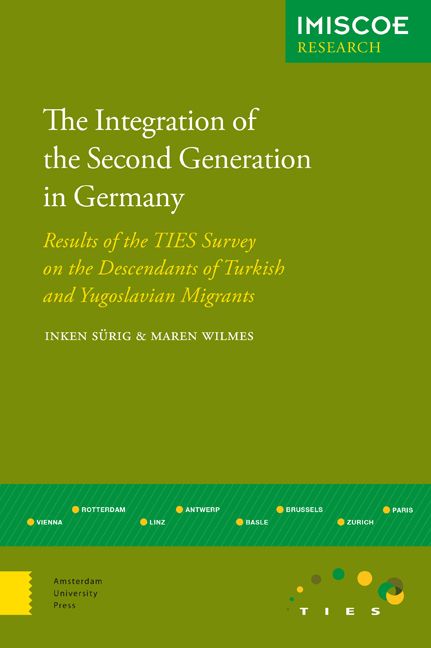 The Integration of the Second Generation in Germany
The Integration of the Second Generation in Germany Book contents
- Frontmatter
- Contents
- Preface: The International Research Project TIES
- 1 Introduction
- 2 Migration History and Basic Demographic Characteristics of the First Generation
- 3 Educational Careers and Educational Outcomes
- 4 Labour Market Positions
- 5 Segregation and Housing
- 6 Ethnic and Cultural Orientations
- 7 Social Relations
- 8 Family Formation and Partner Relationships
- 9 Conclusions and International Comparisons
- References
- Other IMISCOE Research Titles
4 - Labour Market Positions
Published online by Cambridge University Press: 11 December 2020
- Frontmatter
- Contents
- Preface: The International Research Project TIES
- 1 Introduction
- 2 Migration History and Basic Demographic Characteristics of the First Generation
- 3 Educational Careers and Educational Outcomes
- 4 Labour Market Positions
- 5 Segregation and Housing
- 6 Ethnic and Cultural Orientations
- 7 Social Relations
- 8 Family Formation and Partner Relationships
- 9 Conclusions and International Comparisons
- References
- Other IMISCOE Research Titles
Summary
Introduction
Work, or in other words integration into the German labour market, is defined in migration research as the main path to inclusion by which migrants become integrated into the host society. Qualifications gained in the receiving country undoubtedly play a crucial role here, but ultimately, successful integration is mainly measured by the individual migrant's success on the labour market. Here, ‘integration’ primarily means integration into the regular labour market. It goes without saying that the significance of education must not be underestimated. Vocational qualifications and university degrees set the course for potential entry to the regular labour market, easing access to it, while those who leave school without qualifications tend to end up in unskilled or semi-skilled jobs. In the event of economic fluctuations, however, these kinds of jobs tend to be affected by redundancies more frequently and more severely than skilled jobs that require qualifications.
In the following, in line with Bommes & Kolb (2004: 3), the economic integration mentioned above will be defined in broad terms as the ‘general ability to pay and the effort to gain this ability by either selling services or goods’. Based on this definition, ‘economic integration’ addresses the issue of whether, and to what extent, an individual can show this ability. This goes beyond fundamental integration in the labour market, that is, the provision of labour in exchange for wages. Although earnings and self-employment are certainly the most relevant activities for obtaining this ability, other functional equivalents to earnings, such as social transfers and welfare state arrangements, can also reasonably be included in this framework. They are, after all, another way of ensuring an individual's ‘ability to pay’. Nonetheless, ‘work’ is doubtlessly ‘the most relevant strategy in the past and the future for individuals to secure their “economic integration”’ (Bommes & Kolb 2004: 4). It therefore seems reasonable to orientate individual educational careers towards integration into the labour market. This also underlines how important the transition from education and training to the labour market is for economic integration.
- Type
- Chapter
- Information
- The Integration of the Second Generation in GermanyResults of the TIES Survey on the Descendants of Turkish and Yugoslavian Migrants, pp. 69 - 100Publisher: Amsterdam University PressPrint publication year: 2015


